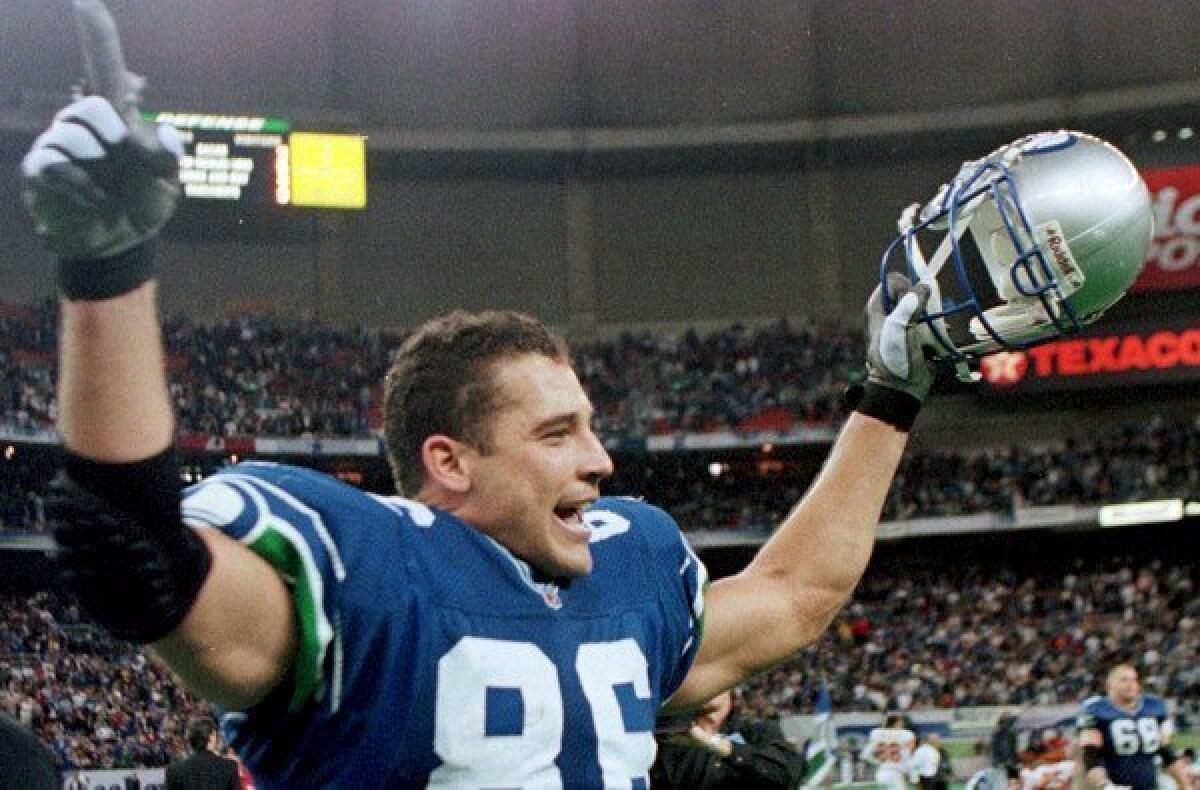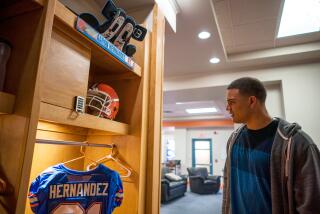Former NFL player describes the pressure to use human growth hormone

- Share via
Christian Fauria spent 13 seasons as an NFL tight end. He won two Super Bowl rings with the New England Patriots. He understands the hunger for any possible physical edge.
But he said he couldn’t bring himself to use human growth hormone.
He did buy it though. He held the vials in his hands. He contemplated injecting himself with the banned substance, but…
“Too chicken to go through with it,” Fauria told The Times on Wednesday.
“I did my research. I had tons of ankle problems, and I was looking for a way to get back faster. I purchased it.… But what you had to go through to do it, at least the guys I talked to, I was like, ‘No way. You can’t regulate that stuff.’ I had no desire to be shooting myself up with a needle once or twice a week. I just wasn’t doing it.”
Fauria’s disclosure comes as the NFL and NFL Players Assn. are poised to conduct a “population study,” drawing blood from all NFL players to determine a baseline for what constitutes an abnormal HGH reading.
The union sent a memo to players and their representatives this week, outlining a tentative agreement for the league to test 40 players each week of the season, with positive tests drawing four-week suspensions. Players who failed would be subject to additional testing for the next two seasons. A player who tested positive a second time would be suspended eight games; a player whose test results remained negative during that period would be removed from the list.
The sides have gone back and forth on blood testing since the summer of 2011, when the issue was supposed to have been resolved as part of the latest collective-bargaining agreement. There is no timetable for the start of testing as the sides continue to negotiate the details.
Fauria said he considered doing almost anything for a career edge, even if it meant breaking the rules. He played for Seattle, New England, Washington and Carolina in a career that stretched from 1995 to 2007. He said the presence of HGH was a fact of life in the league, although he couldn’t say whether the use was rare or rampant.
“I didn’t realize it until my sixth year,” said Fauria, 41, a former Crespi High standout who was playing for the Seahawks at the time. “Before that, everybody was taking ephedrine and creatine, stuff like that. Everything was legal, vitamins, supplements.
“But the HGH, I didn’t really become aware of it until my ankles were jacked up. I started seeing guys like Olympic coaches, people who were training Olympic athletes. When I went to that elite level, I was like, ‘Whoa! There’s another world out here.’ I was like, ‘This is what they do? Holy cow!’”
It was then, he said, that he became aware of HGH use by fellow players.
“I know guys who did it, and I remember saying, ‘This guy is going to the Pro Bowl! He’s shredded! Massive!’” he said. “Sure enough, they’d get hurt the next year. It had something to do with guys’ muscles getting so big that their tendons couldn’t hold them. They were pulling their hamstrings, tearing their muscles. It was a train wreck.
“I was one of those guys who said, ‘No way. Nobody’s doing it.’ And then I just remember playing against some guys who will remain nameless, and I remember going, ‘This is a joke.’ Because I remember working my tail off, harder than I ever did before. My energy wasn’t as high. My strength — which I thought was high — wasn’t. And I remember sitting there going, ‘I am running uphill in a snowstorm with no shoes.’ That’s what I felt like.
“I remember when certain guys got off of it — because they got nabbed, or the league started cracking down — they were a complete different person. One thousand percent. I remember being [ticked], like, this is baloney. Come the fourth quarter, they didn’t have nearly the amount of energy, they weren’t nearly as strong.”
During an off-season late in his career, Fauria said, he was hobbled by chronic ankle problems and drove from Phoenix to San Diego to buy HGH from an amateur pharmacist.
“It always wound up being the same kind of song and dance, some shadiness involved in it,” he said. “This guy is a pharmacist but doesn’t have a license, he works out of his house. Or, ‘Go to this place and ask for Jimmy in the back.’ I was like, what? ‘Go across the border into Tijuana and get this.’”
Ultimately, Fauria said he did not use the hormones, not because they were against the rules but because he was unsure about their long-term effects.
“I had a really good physical therapist who I trusted immensely,” he said. “He was really smart. We would talk about it, and he did a lot of research about it. At that point, there wasn’t enough documentation on what the long-term effects were. You could guesstimate, but it wasn’t worth the risk, even for a short-term gain.
“I always told myself, ‘Slow and steady will win the race. They might be the rabbit, but eventually something’s going to happen and I’m going to catch up to them.’”
Fauria still has a vested interest in the NFL. His nephew, Joseph Fauria, is a former UCLA tight end who’s now a rookie with the Detroit Lions.
Even though he’s been out of the league six years, Fauria believes the field remains slanted. By his thinking, even if HGH is rooted out of the league, the do-whatever-is-necessary mentality will remain.
“The game’s constantly changing,” he said. “But what will not change is individual athletes’ desire to get an edge, and how you get that edge.”
Twitter: @LATimesfarmer
times.com
Twitter: @LATimesfarmer
More to Read
Go beyond the scoreboard
Get the latest on L.A.'s teams in the daily Sports Report newsletter.
You may occasionally receive promotional content from the Los Angeles Times.











